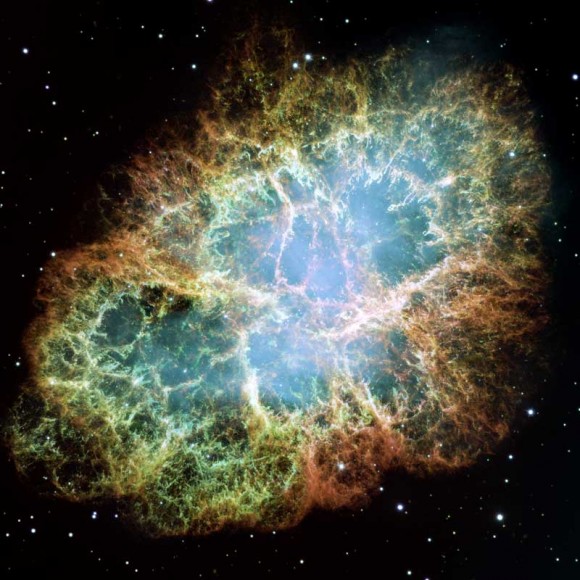

| Visitors Now: | |
| Total Visits: | |
| Total Stories: |

| Story Views | |
| Now: | |
| Last Hour: | |
| Last 24 Hours: | |
| Total: | |
Cosmic Explosion Left Imprint in Fossil Record

Ancient iron-loving bacteria may have collected particles from a supernova that exploded about 2.2 million years ago. The Crab Nebula, shown here in this image from NASA’s Hubble Space Telescope, is much younger having exploded in 1054. Credit: NASA, ESA, J. Hester and A. Loll (Arizona State University)
Ancient iron-loving bacteria may have scooped up evidence of a nearby supernova explosion 2.2 million years ago, leaving an extraterrestrial iron signature in the fossil record, according to German researchers presenting their findings at a recent meeting of the American Physical Society.
In 2004, German scientists reported finding an isotope of iron in a core sample from the Pacific Ocean that does not form on Earth. The scientists calculated the decay rate of the radioactive isotope iron-60 and determined that the source was from a nearby supernova about 2 million years ago. The blast, they say, was close enough to Earth to seriously damage the ozone layer and may have contributed to a marine extinction at the Pliocene-Pleistocene geologic boundary.
(…)
Read the rest of Cosmic Explosion Left Imprint in Fossil Record (225 words)
© John Williams for Universe Today, 2013. |
Permalink |
No comment |
Post tags: iron-60, magnetosomes, supernova
Feed enhanced by Better Feed from Ozh
2013-04-16 11:03:51
Source: http://www.universetoday.com/101494/cosmic-explosion-left-imprint-in-fossil-record/
Source:


